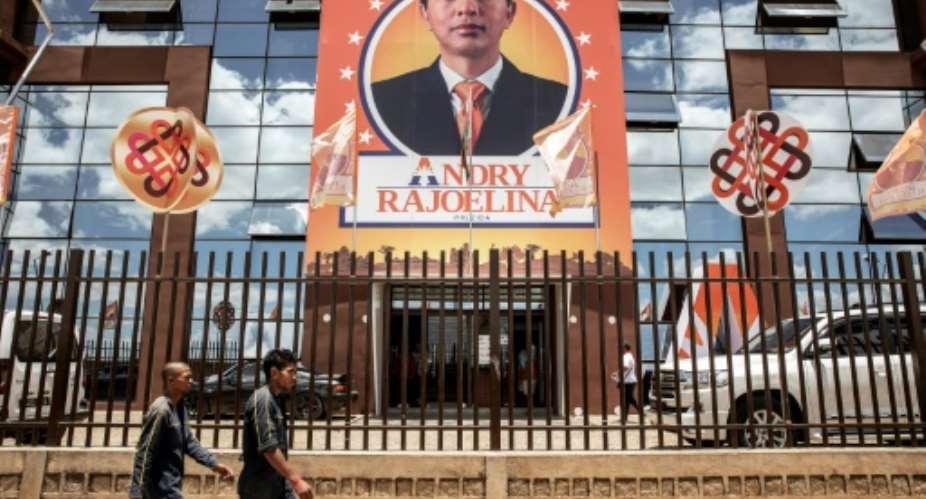For months, they have bombarded voters with campaign slogans and speeches by "their" candidate, but on Tuesday, two fiercely-partisan media groups in Madagascar fell silent a day before the presidential run-off election.
The "ceasefire" -- in line with electoral law -- is in stark contrast to the battle of the airwaves that has raged between the competing media empires owned by candidates Andry Rajoelina and Marc Ravalomanana.
In the capital Antananarivo, the gleaming glass headquarters of the Viva TV / FM group carries a huge portrait of its owner Rajoelina and is decked out in the orange of his campaign.
"We are exhausted and ready for the end. We did not skimp on our efforts," smiles Viva director Rinah Rakotomanga in a t-shirt bearing an image of Rajoelina, who was president from 2009 to 2014.
The Viva television and radio channels have been at the heart of Madagascar's election campaign.
Its news bulletins, debates, live public meetings have upset the usual TV routines and become a formidable electoral machine serving the political ambitions of its owner.
With more than 80 journalists, technicians and executives, and state-of-the-art facilities, the outlet was bought by Rajoelina in 2007 when he was an unknown advertising executive campaigning to become mayor of Antananarivo.
Since buying Viva, he has poured untold money into it -- and results appear to be impressive.
Last month, the 44-year-old took the lead in the first round of the presidential election with 39.23 percent of the vote, ahead of the 35.35 percent won by his rival Marc Ravalomanana.
Control over information
Wednesday's vote will decide the next president of the Indian Ocean island, which has often been wracked by instability.
In a predominantly rural country, TV and radio remain the key sources of information despite the growth of social media.
"Communication is the nerve system of the war," says Rakotomanga, a veteran journalist, who denies that Viva is a crude propaganda tool.
"At Viva, we are not fanatics. Of course, we support a candidate but we remain professionals, we talk about the other candidate," she adds.
"Today, almost everyone is watching Viva, even our opponents."
 Marc Ravalomanana is the head of the rival Malagasy Broadcasting Corporation (MBC). By Mamyrael (AFP/File)
Marc Ravalomanana is the head of the rival Malagasy Broadcasting Corporation (MBC). By Mamyrael (AFP/File)
Its competitor Malagasy Broadcasting Corporation (MBC), the channel of Marc Ravalomanana, is a far weaker operation.
"They are much more aggressive than us," says its director, Joel Ralaivahoita. "And they have more money, we are just starting up again."
Compared to Viva's glittering headquarters, the MBC building is full of deserted corridors and empty offices, with only about 30 journalists on the payroll.
In the control room, a technician oversees the schedule.
Outside, ransacked buildings still bear the marks of MBC's rocky past. In 2009, the station suffered the wrath of violent pro-Rajoelina demonstrations that forced Ravalomanana to resign as president.
MBC was not allowed to resume broadcasting until June -- just in time to support its boss.
Fighting neutrality?
"It is a generalist channel but with the objective, in the election period, to help the founder to get his message across," says Ralaivahoita.
Despite being ferocious competitors, the two chains this year united to successfully fight against a law forcing the private media to be more neutral.
The two candidates' grip over the media has drawn criticism from international observers and rival opposition groups in a country beset by poverty and corruption.
"Our people are not educated, they drink in everything that is said on the radio or television. It is the origin of all the manipulation," said former education minister Paul Rabary, one of 34 candidates swept away by Rajoelina and Ravalomanana in the first round.
"The network bosses do not care," adds Emee Ratsimbazafy, of the KMF/CNOE group that works for better public education.
"As soon as the polls close on Wednesday, they will launch their next battle -- for the results."





 Election 2024: Don’t be complacent, we haven’t won yet – Asiedu Nketia cautions ...
Election 2024: Don’t be complacent, we haven’t won yet – Asiedu Nketia cautions ...
 Election 2024: Stop fighting over positions in Mahama’s next govt – Asiedu Nketi...
Election 2024: Stop fighting over positions in Mahama’s next govt – Asiedu Nketi...
 Prof Jane Naana Opoku-Agyemang will restore dignity of vice presidency – Fifi Kw...
Prof Jane Naana Opoku-Agyemang will restore dignity of vice presidency – Fifi Kw...
 'Ghana beyond aid' has turned out to be 'Ghana without compass' – Naana Opoku-Ag...
'Ghana beyond aid' has turned out to be 'Ghana without compass' – Naana Opoku-Ag...
 Nation builder Mahama will deliver on his promise of a 24-hour economy for the b...
Nation builder Mahama will deliver on his promise of a 24-hour economy for the b...
 Prof Jane Naana is more than qualified to be Ghana’s first vice president and ev...
Prof Jane Naana is more than qualified to be Ghana’s first vice president and ev...
 WENDA petitions Akufo-Addo, Speaker of Parliament to make vote-buying illegal
WENDA petitions Akufo-Addo, Speaker of Parliament to make vote-buying illegal
 Supreme court declares payment of wages to spouses of President, Vice President ...
Supreme court declares payment of wages to spouses of President, Vice President ...
 Publish full KPMG report on SML-GRA contract – Bright Simons to Akufo-Addo
Publish full KPMG report on SML-GRA contract – Bright Simons to Akufo-Addo
 Kumasi International Airport to begin full operations by end of June
Kumasi International Airport to begin full operations by end of June
